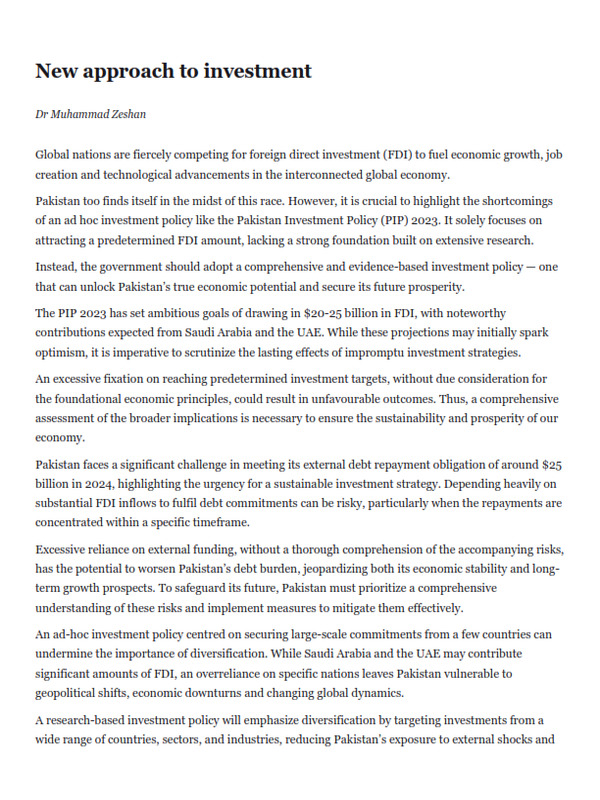New approach to investment
Global nations are fiercely competing for foreign direct investment (FDI) to fuel economic growth, job creation and technological advancements in the interconnected global economy.
Pakistan too finds itself in the midst of this race. However, it is crucial to highlight the shortcomings of an ad hoc investment policy like the Pakistan Investment Policy (PIP) 2023. It solely focuses on attracting a predetermined FDI amount, lacking a strong foundation built on extensive research.
Instead, the government should adopt a comprehensive and evidence-based investment policy — one that can unlock Pakistan’s true economic potential and secure its future prosperity.
The PIP 2023 has set ambitious goals of drawing in $20-25 billion in FDI, with noteworthy contributions expected from Saudi Arabia and the UAE. While these projections may initially spark optimism, it is imperative to scrutinize the lasting effects of impromptu investment strategies.
An excessive fixation on reaching predetermined investment targets, without due consideration for the foundational economic principles, could result in unfavourable outcomes. Thus, a comprehensive assessment of the broader implications is necessary to ensure the sustainability and prosperity of our economy.
Pakistan faces a significant challenge in meeting its external debt repayment obligation of around $25 billion in 2024, highlighting the urgency for a sustainable investment strategy. Depending heavily on substantial FDI inflows to fulfil debt commitments can be risky, particularly when the repayments are concentrated within a specific timeframe.
Excessive reliance on external funding, without a thorough comprehension of the accompanying risks, has the potential to worsen Pakistan’s debt burden, jeopardizing both its economic stability and long-term growth prospects. To safeguard its future, Pakistan must prioritize a comprehensive understanding of these risks and implement measures to mitigate them effectively.
An ad-hoc investment policy centred on securing large-scale commitments from a few countries can undermine the importance of diversification. While Saudi Arabia and the UAE may contribute significant amounts of FDI, an overreliance on specific nations leaves Pakistan vulnerable to geopolitical shifts, economic downturns and changing global dynamics.
A research-based investment policy will emphasize diversification by targeting investments from a wide range of countries, sectors, and industries, reducing Pakistan’s exposure to external shocks and ensuring a more robust and resilient economy.
Focusing solely on attracting FDI can overshadow the immense potential of local businesses and entrepreneurs. While foreign investment is undoubtedly valuable, nurturing domestic innovation, entrepreneurship and technological advancement is equally vital. A research-backed investment policy will strike a balance, fostering an environment conducive to local enterprise development and attracting foreign investment that complements and strengthens domestic capabilities. This approach would create a virtuous cycle of economic growth, job creation, and sustainable development.
To foster sustainable and inclusive economic growth, Pakistan stands at a crucial juncture where it must design such an investment policy, which hinges upon a profound comprehension of the nation’s economic strengths, weaknesses, and untapped growth potential.
Here are the pivotal reasons why the implementation of such a policy is of utmost importance: It will empower Pakistan to recognize and capitalize on its comparative advantages across diverse sectors. By undertaking comprehensive studies and analyses, policymakers can pinpoint industries and sectors where Pakistan possesses inherent strengths such as agriculture, textile, information technology, and renewable energy.
A targeted approach of this nature will attract investments that align with the country’s core competencies, subsequently yielding heightened productivity, job opportunities, and bolstering its competitive edge in the global marketplace.
Pakistan’s economic progress can be strengthened through the implementation of well-designed investment policy. Such a policy will empower the country to effectively assess the risks and rewards linked to various investment prospects. Thorough research and analysis will equip policymakers with valuable knowledge regarding the enduring sustainability, economic implications, and risk elements associated with specific investments.
With well-informed choices, Pakistan can maximize its investment inflows while minimizing the potential pitfalls of mounting debt burdens. Ultimately, this approach will guarantee optimal returns on investment and foster a stable economic trajectory for the nation.
Revitalizing Pakistan’s investment strategy through well-informed policies holds immense potential for the nation’s progress. By placing emphasis on technology transfer, skill development, and capacity building, we can pave the way for a brighter future.
Instead of fixating on capital-intensive ventures, it is crucial for Pakistan to actively pursue investments that foster knowledge sharing, drive innovation, and empower its workforce. Such a progressive approach will enable local industries to enhance their technological infrastructure, boost productivity, and cultivate an environment conducive to sustainable economic growth. Let us embrace this transformative strategy, propelling Pakistan towards prosperity and global competitiveness.
Revamping Pakistan’s investment policy based on thorough research will tackle key elements affecting the business landscape, including regulatory frameworks, business-friendly environment, transparency, and governance.
By pinpointing and resolving obstacles and inefficiencies, Pakistan can establish a more enticing and competitive atmosphere for investors. This strategic approach will attract a diverse pool of foreign investors and spur domestic entrepreneurship, fuelling a positive cycle of economic progress and advancement.
The PIP 2023, with its ambitious FDI goals, must be examined critically to avoid an ad-hoc approach. To ensure Pakistan’s economic future, a well-informed investment policy rooted in research is crucial. Such a policy should leverage Pakistan’s comparative advantages, address risks, nurture domestic capabilities, and foster a competitive business environment.
By adopting evidence-based strategies, Pakistan can unleash its true economic potential, bolster resilience against external shocks, and lay the foundation for sustainable and inclusive growth. Let’s not lose sight of the bigger picture — Pakistan’ economic prosperity and the well-being of its people — by fixating solely on short-term investment targets.
The writer is a research fellow at the Pakistan Institute of Development Economics (PIDE).




